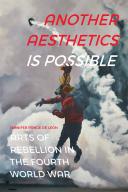Jennifer Ponce de León
Associate Professor of English
Office Hours
On leave for the 2025-2026 academic year
Jennifer S. Ponce de León is Associate Professor of English at the University of Pennsylvania, where she is also faculty in Latin American and Latinx Studies (LALS) and Comparative Literature; affiliated faculty in Gender, Sexuality, and Women’s Studies (GSWS) and Cinema Studies; and a member of the graduate groups in Hispanic Studies and Art History. Her interdisciplinary scholarship addresses culture and politics in the Americas in the 20th and 21st centuries, focusing on the history and culture of antisystemic movements. During the 2025-2026 academic year she will be a Fellow at the Institute for Advanced Study in Princeton, New Jersey.
Dr. Ponce de León is Associate Director of the Critical Theory Workshop/Atelier de Théorie Critique, a non-profit institution that organizes interviews, book launches, and public symposia with scholars from around the world, hosting an extensive video archive as a free educational resource. She co-directs the Critical Theory Workshop’s annual summer seminar, which takes place over the course of three weeks at the École des Hautes Études en Sciences Sociales in Paris and online.
Dr. Ponce de León’s first book, Another Aesthetics Is Possible: Arts of Rebellion in the Fourth World War (Duke University Press, 2021), including Zapatismo, anti-displacement struggles, human rights activism, and resistance to imperialist “free trade” agreements. She is co-editor, with Randall Williams and Richard T. Rodríguez, of Puto: The Selected Plays of Ricardo A. Bracho, forthcoming from Duke University Press in Spring 2026. Dr. Ponce de León co-authored with Gabriel Rockhill the Introduction to the English translation of Domenico Losurdo’s Western Marxism: How It Was Born, How It Died, How It Can Be Reborn (Monthly Review Press, 2024), and she and Rockhill are co-editing a special issue on Losurdo’s work for International Critical Thought. Together with Dr. Rockhill and Dr. Immanuel Ness, Dr. Ponce de León co-edits two book series: Anti-Imperialist Marxism for Iskra Books and Studies in Anti-Imperialist Marxism for Brill.
Dr. Ponce de León has presented her research on contemporary Latin American and Latinx art, theater, and performance in publications, exhibitions, and arts and scholarly programming. She was the curator of Resurgent Pasts, Insurgent Futures (2017), an exhibition and film program at the Slought Foundation featuring contemporary Chicanx and Latin American art. She also curated Arrhythmias of Counter-Production: Engaged Art in Argentina, 1995-2011 for the University Art Gallery of the University of California, San Diego in 2013. She led the research for Los Angeles Goes Live: Exploring a Social History of Performance Art in Southern California, 1970-1983 (2011), an exhibition, conference, and performance series at LACE (Los Angeles Contemporary Exhibitions) and she was the lead organizer of Público Transitorio (2007), a multi-site symposium featuring Latin American and Latinx artists, activists, and architects.
She has published widely on contemporary Latin American and Latinx art, theater, and performance. Her publications include:“Cartographies of Contemporary Class Struggles: The Art and Pedagogy of the Iconoclasistas” in Latin American and Latinx Visual Culture (Fall 2023); "After the Border is Closed: Fascism, Immigration, and Internationalism in Ricardo A. Bracho’s Puto," in American Quarterly (December 2021); “Through an Anticolonial Looking Glass: On Restitution, Indigenismo, and Zapatista Solidarity in Raiders of the Lost Crown” in American Quarterly (March 2018) and “How to See Violence: Artistic Activism & the Radicalization of Human Rights” in ASAP/Journal (May 2018). Her writing has also appeared in edited collections, including Talking to Action: Art, Pedagogy and Activism in the Americas (U. Chicago Press, 2017); Dancing with the Zapatistas (Duke U. Press, 2015); Live Art in LA, 1970-1983 (Routledge, 2012); MEX/LA: Mexican Modernisms in Los Angeles (Hatje Cantz Verlag, 2011); and Art and Activism in the Age of Globalization: Essays on Disruption (NAi, 2011).
Dr. Ponce de León is currently working on three books. Her monograph “Culture & U.S. Empire: Fascism, Racism, and Class Struggle” is framed in terms of a methodological confrontation between the essentializing tendencies of culturalism that appear in post-1960s US academic theorizing, exemplified recently by decolonial theory, and the historical materialist and dialectical orientation of Marxism, particularly in the heterodox forms it has taken in the Global South and in Latin America, specifically. It argues for the superiority of the latter’s explanatory and transformative power, especially for understanding and combatting imperialism, (neo)colonialism, fascism, and racism. “Revolutionizing Aesthetics,” which Dr. Ponce de León is co-authoring with Gabriel Rockhill for Columbia University Press’s series New Directions in Critical Theory, intervenes in debates within Marxist aesthetics and discussions of the culture industry, while offering analyses of works of literature, film, and visual and performance art from the Americas and Europe. An article from this project, “Toward a Compositional Model of Ideology: Materialism, Aesthetics & Cultural Revolution,” was published in Philosophy Today, 63.1 (Winter 2019). Dr. Ponce de León is also co-editing an anthology on U.S. Latinx Marxisms with Ben Olguín and Jaime González.
Dr. Ponce de León received her PhD in American Studies from the Department of Social and Cultural Analysis at New York University, her M.A. in Art History from the University of California, Los Angeles, and her A.B. in Literature from Harvard University.

 Department of English
Department of English

